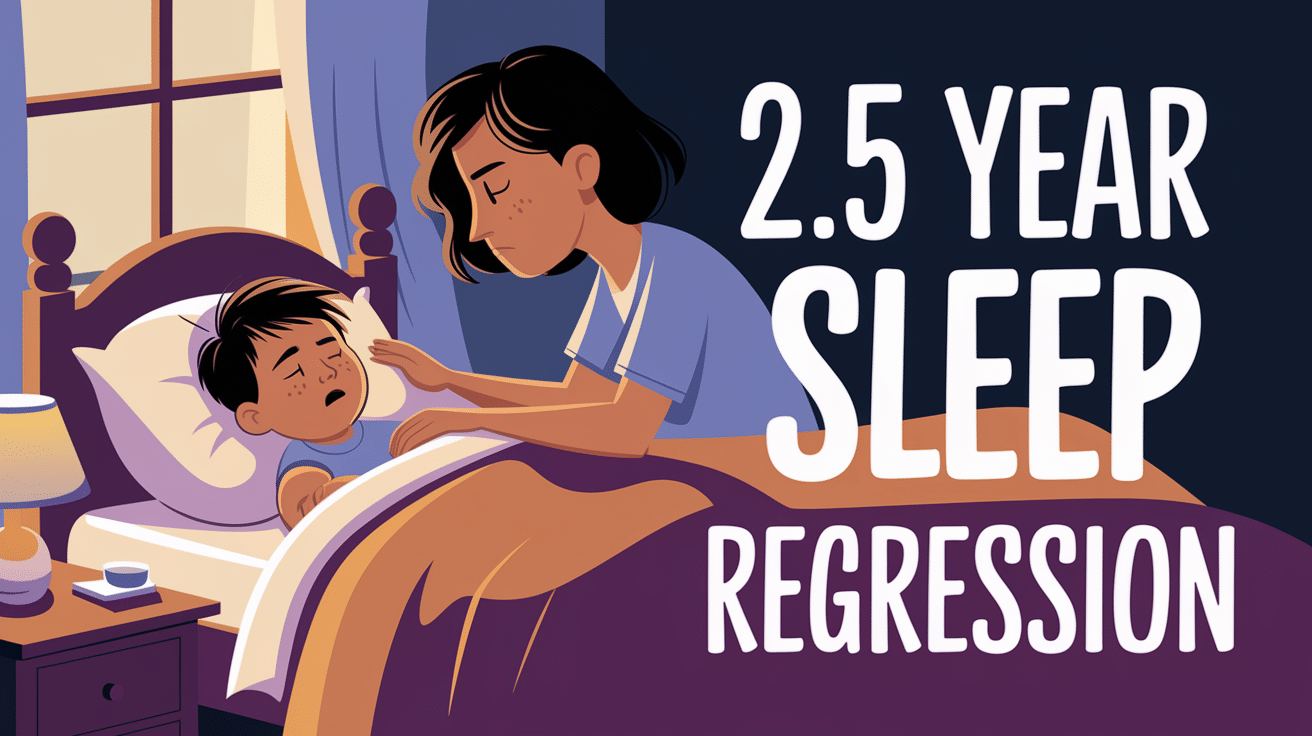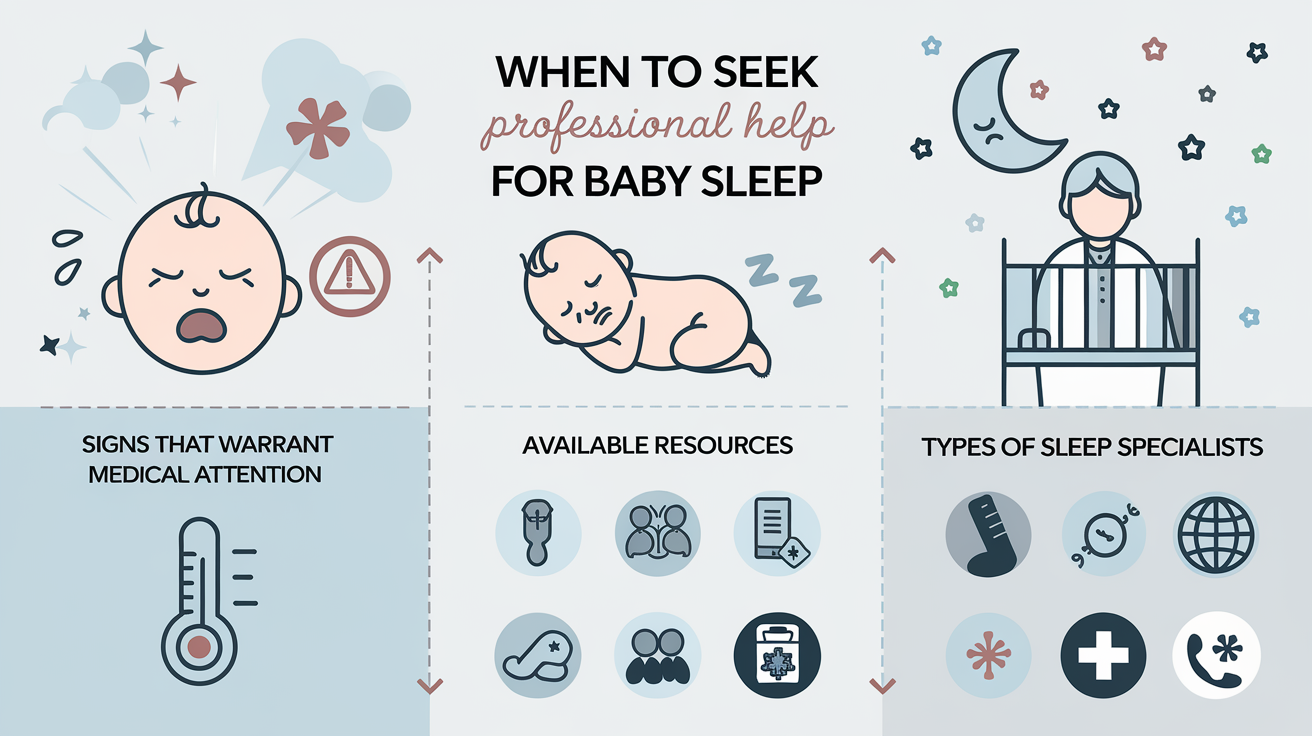
Just when you thought your toddler’s sleep battles were behind you, the infamous 2.5-year sleep regression arrives like an uninvited houseguest.
One night, your child is sleeping peacefully through the night, and the next, they’re staging midnight protests worthy of a tiny activist.
If your once-perfect sleeper is suddenly refusing bedtime, waking up repeatedly, or starting their day at an hour that coffee can’t fix, you’re not alone.
This challenging phase coincides with explosive brain development and a newfound desire for independence that turns “no” into your toddler’s favorite word—especially at bedtime.
The good news is that this regression is normal and temporary. Understanding what’s happening in your toddler’s developing mind offers practical strategies for steering this challenging sleep phase with confidence and patience.
What is the 2.5-Year Sleep Regression?
The 2.5-year sleep regression is a temporary phase when toddlers who were sleeping well suddenly start having sleep troubles.
Unlike earlier regressions that are linked mostly to physical growth or learning to roll over (4-month) or newfound walking abilities (18-month), the 2.5-year regression connects strongly to big mental and emotional changes.
During this time, you might notice your baby fighting bedtime more than usual, waking up several times at night, or popping awake at 5 AM ready to start the day.
Many toddlers also become extra clingy at bedtime, develop new fears about sleeping alone, or insist on elaborate bedtime rituals.
This regression happens because your child’s brain is developing rapidly – they’re more aware of being separate from you, have better imagination (including imagining scary things), and are testing their growing independence by saying “no” to sleep.
The Causes Behind the 2.5-Year Sleep Regression

Your toddler’s suddenly disrupted sleep isn’t random – it’s connected to the big changes happening in their little body and mind.
At this age, their brains are making huge leaps—they’re talking more, thinking more deeply, and their imagination is exploding (sometimes with scary monsters under the bed). Many toddlers also go through a phase of not wanting to be away from their parents, making bedtime especially hard.
Big life changes like starting preschool, welcoming a new sibling, or moving to a big-kid bed can also throw sleep off track. Physical issues matter as well—those stubborn 2-year molars can cause pain that wakes them up.
Perhaps most challenging is their growing need for control – “No!” becomes their favorite word as they test boundaries, including at bedtime.
Understanding these causes helps you respond with patience instead of frustration during this challenging but normal phase.
Signs of the 2.5-Year Sleep Regression
The 2.5-year sleep regression shows up in several noticeable ways. Your previously good sleeper might suddenly change their patterns dramatically.
Most toddlers show multiple signs at once. These changes typically last for 2-6 weeks before sleep improves again.
- Strongly resisting going to bed at normal bedtime.
- Taking much longer to fall asleep once in bed.
- Waking up multiple times during the night.
- Calling for parents repeatedly after being put to bed.
- Early morning wake-ups (sometimes as early as 4-5 AM).
- Increased nightmares or night terrors.
- Suddenly refusing to nap or fighting nap time.
- New bedtime fears (monsters, darkness, being alone).
- Wanting to climb into parents’ bed in the middle of the night.
How Long Does the 2.5-Year Sleep Regression Last?

The 2.5-year sleep regression typically lasts between 2 to 6 weeks for most children, though this timeline can vary.
Your toddler might bounce back to better sleep habits within just a couple of weeks, while others might take longer to settle back into healthy sleep patterns.
Every child is unique. Some naturally adapt more quickly to changes, while others need more time to process new developmental stages.
Your approach as a parent also matters; maintaining consistent routines despite the challenges can help shorten the regression period. Remember that this phase is temporary, even when those middle-of-the-night wakings feel never-ending.
The key is patience – understanding that your child isn’t being difficult on purpose but is working through important brain and emotional development.
With steady support and consistent boundaries, your baby will eventually return to better sleep habits.
How to Handle the 2.5-Year Sleep Regression?
Dealing with sleep regression requires both patience and a solid plan. Your consistent response will help your toddler feel secure even as they test boundaries.
Small adjustments to your bedtime approach can make a big difference during this phase. Remember that your calm demeanor helps your toddler learn to calm themselves.
- Stick to the same bedtime routine every night – predictability helps toddlers feel secure.
- Keep sleep and wake times consistent, even on weekends.
- Set clear, simple bedtime limits while acknowledging your child’s feelings.
- Make the bedroom sleep-friendly with comfortable temperature and minimal light.
- Try a night light and comfort object if your child develops new fears.
- Check for physical causes like teething pain or illness if sleep suddenly worsens.
- Respond calmly to night-wakings with brief reassurance, then leave again.
- Avoid creating new sleep habits you don’t want to continue (like lying with them until asleep).
- Consider a reward chart for staying in bed to motivate positive sleep behavior.
Avoid Common Myths About Sleep Regression
Don’t let misinformation make this challenging phase even harder. Many parents wrongly believe that 2.5-year-old sleep regression means their child “doesn’t need as much sleep anymore,” but toddlers still need 11-14 hours of sleep daily for healthy development.
Another myth is that “they’ll outgrow it without any effort.” While the phase is temporary, how you respond now shapes long-term sleep habits.
Some parents worry they’ve “failed at sleep training” when regression hits, but even perfectly sleep-trained children go through this developmental stage.
The idea that “sleep regressions happen at exact ages” isn’t true either – they occur around developmental milestones, which vary between children.
Finally, contrary to popular belief, keeping toddlers up later won’t make them sleep better – it typically backfires with overtiredness and more night-wakings.
Understanding these myths helps you approach this phase with realistic expectations.
When to Seek Professional Help?

While most toddler sleep struggles are normal, sometimes you might need extra help. If your child’s sleep problems last longer than 6-8 weeks or seem unusually severe, it might be time to talk to an expert.
Consider consulting a sleep consultant if you’ve tried consistent routines and gentle approaches without improvement or if you’re feeling overwhelmed and exhausted.
These specialists can create a plan specifically for your family’s needs and values around sleep.
Contact your child’s doctor if you notice worrying signs like loud snoring, gasping during sleep, extreme daytime tiredness, or if sleep troubles come with other changes in behavior, appetite, or development. Your pediatrician can check for possible medical issues like sleep apnea, reflux, or allergies that might be disrupting your sleep.
Remember that asking for help isn’t a sign of failure—it’s a smart way to support your whole family’s well-being.
Wrapping It Up
The 2.5-year sleep regression can test even the most patient parent’s resolve, but remember that this challenging phase is both temporary and normal.
Your toddler isn’t trying to make life difficult; they’re working through important developmental milestones that will help them grow into healthy, independent children.
By maintaining consistent routines, responding calmly and firmly, and understanding the underlying causes, you can help your baby return to healthier sleep patterns. While some nights might feel endless, most children move beyond this regression within a few weeks.
Trust your parental instincts, reach out for help when needed, and take care of your own sleep needs, too. With time and patience, both you and your toddler will sleep soundly again—until the next chapter in parenting begins.
If you’re interested in more informational content on mothers and babies, feel free to click here and explore other blogs that you might enjoy.
